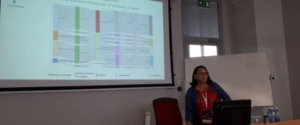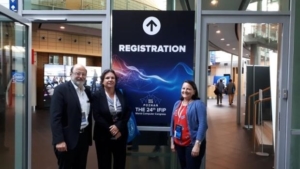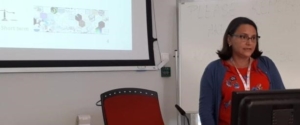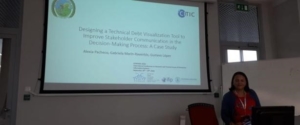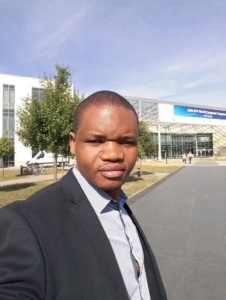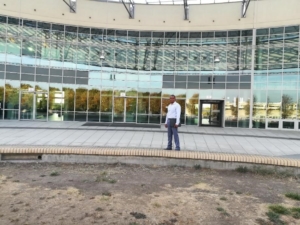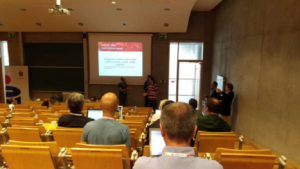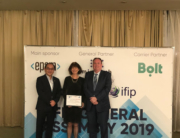Computer Congress (WCC) 2018. They share their experiences below.
Alexia Pacheco – PhD student, Alexia Pacheco, received an IFIP Digital Equity Committee to participate in WCC 2018.
Alexia, who is part of the Computer Science Graduate Program (PPCI) of University of Costa Rica (UCR), presented a paper in CONFENIS entitled: Designing a Technical Debt Visualization Tool to Improve Stakeholder communication in the Decision Making Process: a Case Study.
The authors of paper were: Alexia Pacheco, Gabriela Marín-Raventós and Gustavo López.
According to Alexia, “WCC 2018 was a high quality event. The hosts achieved an excellent organization and the speakers achieved a great performance. The program of the event included diverse topics and current issues. The event allowed the exchange of ideas among the participants on topics of great relevance for the development of society.
“WCC 2018 allowed me to present my research work and receive feedback, as well as establish contacts that are of benefit to complete my doctoral studies. In addition, I was able to expand my knowledge on topics of great importance such as research and practical issues of Enterprise Information Systems, Internet of Things, Data Science, IT research, among others. I thank IFIP Digital Equity Committee for the opportunity provided to achieve my participation in WCC 2018,” she said.
The following photographs are from Alexia’s presentation and participation at WCC 2018.
Pardon Blessings Maoneke – a lecturer and ICT researcher who holds a Master of Commerce in Information Systems from the University of Fort Hare (UFH), Pardon is also studying towards a PhD at UFH, focusing on computer security: text based user authentication. He comments on his experience at Poznan below.
“My experience at the WCC2018 was phenomenal. Research is for the world and research domains we are committed to; hence, the WCC is the best place to be when it comes to showcasing our ideas. Writing a paper for an IFIP conference gave me an opportunity to evaluate my progress on research judging by the feedback I got from established researchers. Their feedback guided me in positioning my contribution within the research field.
Furthermore, I presented my research paper titled: “The Influence of Native Language on Password Composition and Security: A Socioculture Theoretical View”. It was great to share my ideas with other related researchers during and after the presentation. This gave me an opportunity to network and see what other researchers are working on. Presentations from guest speakers who have been in the field of computing for a long time further opened my eyes on a number of issues and subjects of interest.
“I also took part in social events, the conference dinner. Well I must say the food was amazing and the warm reception by the people of Poznan was exceptional. I believe my participation at the WCC2018 is the beginning of many great things to come as I shall continue using such a platform to share my research work while learning from the greats.”
Photos below of Pardon Blessings Maoneke
Tiago França Melo de Lima of: (1) Departamento de Computação e Sistemas / Universidade Federal de Ouro Preto and (2) Programa de Pós-Graduação em Ciência da Computação / Universidade Federal de Minas Gerais in Brazil.
Tiago presented a paper on “Design of a Mixed-Reality Serious Game to Tackle a Public Health Problem” which was co-authored with João Paulo Ferreira Beltrame, Carlos Ramos Niquini, Breno Gonçalves Barbosa and Clodoveu Augusto Davis Júnior. The presentation won the IFIP-ICEC Award 2018 Best Demo / Art Exhibit
Tiago also presented two other papers: “A Systematic Mapping of Game-Based Methods to Tackle a Public Health Problem”, authored with Clodoveu Augusto Davis Júnior, and “A game-based platform to tackle a public health challenge”, also co-authored with Clodoveu Augusto Davis Júnior.
“I am a Computer Science Ph.D. student, and an early career researcher with particular interests in the application of computer science in other areas to help deal with complex problems such as urban planning and diseases prevention and control. I do have interdisciplinary skills such as computer programming, human-computer interaction, modelling and simulation, GIS and geographic databases, developed working with multidisciplinary teams and projects.
“The theme of my Ph.D. project recently changed from the application of modelling and simulation to understand vector-borne diseases dynamics to the use of game-based methods for public health, particularly, aimed at awareness and behavioural changes to prevent diseases transmitted by Aedes aegypti.
“Attending the IFIP World Computer Congress was amazing. It was the first time I participated in this important conference, and the opportunity to meet experts to share and discuss ideas was very helpful. The overall organization of the event was perfect, I have nothing to complain. It was possible to meet specialists and learn with the presented research projects in the area of Entertainment Computing, something precious for a novice in this subject. Furthermore, it was possible to present and discuss my Ph.D. research project with many experts. This experience really helped to evaluate the research questions and adequacy of methodology and think about the next steps. Besides, it was possible to contacts for future collaborations.
The financial support offered by IFIP Digital Equity Committee was essential to enable my participation in the event. Once again, I would like to thank the IFIP Digital Equity Committee.
PHOTO: Tiago receiving the best demo award

